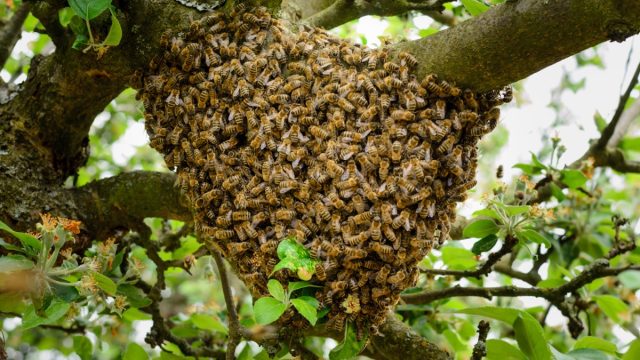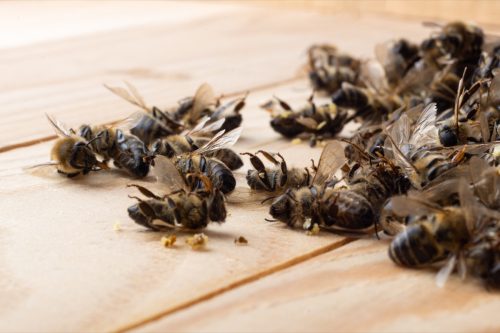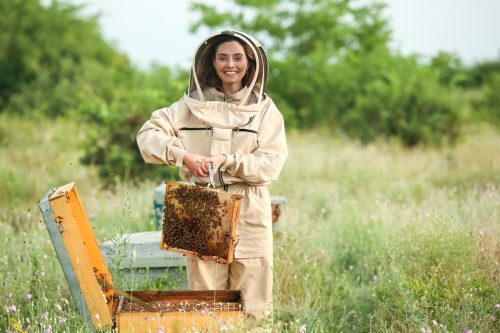It’s Bee Season—Never Do These 5 Things If You See a Swarm

When people see bees, their first reaction is to panic—especially when they’re in a swarm. Allan Bossel, owner and operator at Michigan Bed Bug Specialists, explains that bees swarm because their populations grow, reproduce, and eventually relocate to new areas to start new hives. And thanks to the warmer weather, you might be spotting them more often. “You will see swarms as a cluster or ball of bees hanging from a tree, vehicle, shed, etc. for approximately 24 to 72 hours,’” says Nancy Tedford, an environmental specialist for the Florida Dept of Agriculture and Consumer Services.
Of course, seeing so many bees at once can be a little scary—but they’ll only get angry if you disturb them. Realizing they aren’t a threat to you can be reassuring, however, you should still be properly prepared if you encounter one. We spoke to experts about the things you should never do if you see a swarm of bees.
READ THIS NEXT: If You See This Scary Bug in Your Home, Don’t Kill It, Experts Warn.
1
Swat at them.

This may seem obvious, but trying to swat at them only makes them more likely to sting you. “Swatting or hitting the bees will only make them feel threatened and potentially provoke an attack,” says Ben Hilton, founder and editor at The Gardening Fix.
Bees are typically very mellow when they swarm, so there’s no reason to go after them. While one bee sting can be painful, multiple at one time can be quite dangerous, especially if someone is allergic. They’ll definitely become more aggressive if you try to move them.
Heather Wilson, hobbyist beekeeper and founder of Hearl’s Honeybees, recommends staying calm and not moving. “Pretend the bees have a Do Not Disturb Sign on them,” she advises.
For more insect advice delivered straight to your inbox, sign up for our daily newsletter.
2
Kill them.

If you do come across a swarm of bees, don’t try to hurt or kill them. Miguel Camperos, VP of Operations of SunVara, says that bee populations are dwindling down, so killing an entire swarm can be detrimental to your local environment. If you grow plants, or have a garden of any kind, keeping the bees around is actually more beneficial in the long run.
Bees are responsible for pollinating the food we eat, as well as trees, plants, and flowers. “In most states honeybees are protected, and killing them is a crime that’s punishable by large fines,” says Frank Mortimer, master beekeeper, President of The New Jersey Beekeepers’ Association, and author of Bee People and The Bugs They Love.
3
Spray them with water.

Spraying bees with water is a very bad idea. Again, this will only agitate them and give them more reason to sting you.
Wilson explains that bees try to keep out of the rain as much as possible. “It changes their moods and if they equate a spray of water with sudden rain, they’ll be irritated quickly,” she says.
Their wings are also affected by water. “It’s worth noting that wet bees find it hard to fly, causing them to rest on the ground which can present a risk to children, pets, and even adults if you accidentally step on them,” Hilton says.
4
Cover them with pesticides.

Unlike actual pests, bees really help your plants and vegetation flourish. “Pesticides are toxic to bees and will harm not only the bees, but also other beneficial insects and the environment,” Hilton says.
The chemicals also can scatter the swarm, which is not a good thing when they’re trying to settle. Bees swarm to protect their queen, Hilton tells Best Life. If you choose to spray any type of pesticide or insecticide, you are deliberately disrupting the swarm—and you literally couldn’t pick a worse time.
“During a swarm bees are alert, and understandably have a heightened awareness and response to potential threats, increasing the risk of stings,” Hilton says.
5
Remove it yourself.

You can put yourself in harm’s way if you try and get rid of the swarm yourself—it’s definitely not a DIY project. Mortimer says it’s important to keep in mind that “a swarm will only stay in its temporary location for a few days, as once a space for a new home is located, all the bees will fly away.”
If the swarm doesn’t go away after that short time, it’s best to call a professional beekeeper or pest control service. “Many beekeepers are experts in handling bees, so they are the best people to call,” Bossel says.
When you do call a beekeeper, remember that they might not remove the bees for free. “This is their time, equipment, and skill,” Tedford says “They may even have to buy or rent special equipment for your removal.” But it will be the safest option for you and the bees.